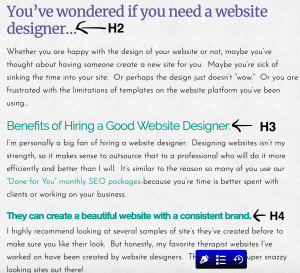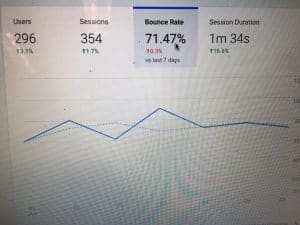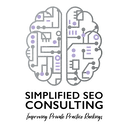They didn’t teach us this stuff in grad school, but we CAN learn it. Trust me SEO marketing for therapists can be learned! Many therapists throughout the United States & abroad learn to implement these techniques with this course right here! Simplified SEO Consulting has seen firsthand how powerful SEO can be in growing a group practice and solo practice. Our team wants to make this easier than ever for YOU to learn as well.
Why Learn Private Practice SEO?
When you learn SEO for your private practice, it can help you more effectively market yourself and your services. SEO (or Search Engine Optimization) can help your website rank higher on search engine results pages, leading to increased visibility and more clients. It is also cost-effective, as you can get more leads without having to spend money on expensive ads. SEO is also a long-term investment, as it builds over time with content and backlinks.
What WIll I learn in the Course?
In this course, you will learn everything you need to know to have an impactful and effective SEO strategy. Including:
- Keyword Research
- Meta Descriptions/Titles
- Content Creation
- On-Page Optimization with demos (internal/external links, photo alt text/title, subheadings/headings, readability
- Building and Obtaining High-Quality Backlinks
- Monitoring Results, Analyzing, and Understanding Data ( with Sterling)
- Implications of the ACA Compact and PsycPact
- Strategy for Multiple Locations and Online Therapy
- Blogging ( with Lynsey and Danica)
- Bonus Content
Who Should Learn SEO Marketing for Therapists Independently?
This SEO course is designed specifically for therapists looking to grow their private practice. Whether you are a solo clinician, a group practice, an integrated practice, working in therapy, or an adjacent field. If you are highly motivated, love to learn, and have the time, and resources to commit to learning, understanding, and implementing SEO, then this is for you. SEO is a long-term investment and this course will get you ready for SEO success.
It Starts With You.
There is no right or wrong SEO strategy. SEO is highly personalized and based on the individual’s business goals, market conditions, audience types, location, etc. That is why learning SEO as an individual is so important. SEO is a dynamic business discipline and no two SEOs will have the exact same approach. By taking this SEO course, you will be able to develop SEO strategies that are tailored to YOUR business and YOUR goals.
What Kind of Commitment Am I Looking At?
At Simplified SEO Consulting, our SEO courses are designed to be engaging and effective. For the SEO course, you will need to devote between 10-12 hours of your time over the length of the course. If you want some additional support, you can schedule paid strategy sessions throughout the course to help you stay on track, clarify your strategy, and help you better implement the material. SEO can be an overwhelming topic, but with the right guidance and support, you can learn SEO in no time.
Will It Be As Effective Hiring an SEO Company?
We believe that SEO can be as effective if you learn SEO on your own. By taking this course, you will gain an understanding of SEO principles and SEO strategy. That knowledge will allow you to make informed decisions when it comes to SEO for your private practice. SEO is an ever-evolving field. What is great thing is that for as long as you have the course you will have the most up-to-date information on SEO, as we learn new information, we update the course accordingly.
Additionally, our team uses these same techniques. We believe SEO optimization is more of an art than a science, so it’s individualized, but you are learning the same things we implement on a daily basis.
How Do I Get The Most Out of SEO Marketing for Therapists Courses?
What I recommend is to take one module at a time and begin to implement these changes you are seeing. It can be really overwhelming to see all the information at once and It’s best to understand each concept, apply it and then come back to the next module. Over time, as you understand SEO and your strategy, it won’t require so much step-by-step focus, it will become more integrated and make more sense. If you are unsure, schedule a strategy session with me! I’m here to help you every step of the way.
Signs Learning From Course is Right for You!
- You are highly motivated and determined to start private practice SEO.
- In fact, you have the time and resources to commit to an SEO course for therapists
- You are ready to take SEO into your own hands
- Maybe, you are interested in SEO as a long-term investment for growing your practice.
- You genuinely enjoy learning SEO and want to stay up-to-date on the latest SEO strategies.
- Perhaps, you are open to investing in SEO training and consulting.
- You are a team player and willing to collaborate with SEO experts.
If this sounds like you, then the SEO course for therapists is the perfect fit! We can’t wait to help you get your SEO strategies up and running! SEO will take time and effort, but it is well worth the investment. Our SEO course for therapists will get you ready
Schedule Your Strategy Session or Start Learning Using Our Top of Search Engine SEO Course for Therapists!
If you can say “yes” to the points above, then SEO marketing for therapist courses are right for you. SEO is a powerful way to make your private practice more visible online and generate leads so you can grow your business. SEO requires commitment and consistency but with the right SEO course, you can learn SEO on your own and become an SEO expert. By investing in SEO training and consulting, you can get the most out of SEO for your private practice.
So, don’t wait any longer – sign up for our SEO Course for Therapists and start achieving SEO success! Our SEO course will provide you with the knowledge and strategies needed to get TOP of search engine positions for your practice. With SEO, you’ll be able to reach a wider audience, increase visibility and grow your private practice. So, why wait? Get SEO training and consulting for your private practice today!
In order to schedule your strategy session:
- Please apply to work with us
- Learn about our team
- Start learning!
Other Services At Simplified SEO Consulting
If you’re looking for other forms of support, we can help! We offer options such as our 12-week training, small group intensives, and courses. Our strategy session can be a great option if you need support getting started with SEO or doing a site move or redesign. Or, if you’re ready to work with a passionate and skilled team, our Done for You Program may be a great following approach.
About the Author
Jasmine is the SEO Training Coordinator and offers free consultations for Simplified’s SEO Consulting on our services. Jasmine is a Clinical Mental Health Counselor and recently earned her degree from Northwestern University. She works to help people with a strategy with national rankings, eating disorder specialties, trauma, sports psychology, postpartum/pregnancy/parenting, high achievers, and much more. Schedule a consult soon!




 If you are a group practice owner ready to really focus on getting your website found, book a free consultation to discuss how my SEO services might be able to help!
If you are a group practice owner ready to really focus on getting your website found, book a free consultation to discuss how my SEO services might be able to help!